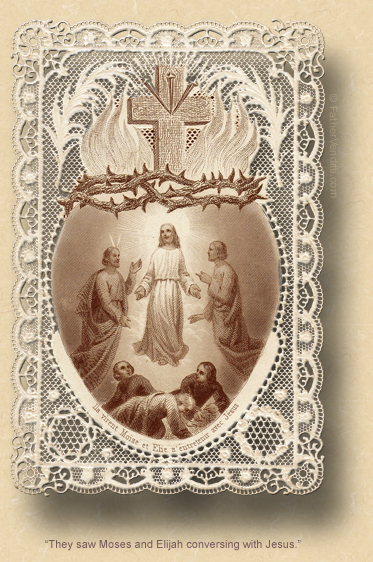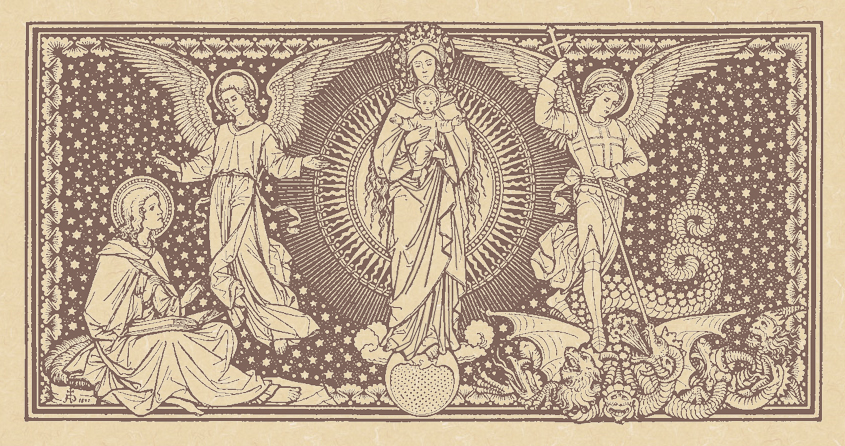But for Wales?
The Eighteenth Friday of Ordinary Time; or, the Memorial of the Dedication of the Baslica of Saint Mary Major.
Lessons from the secondary feria, according to the ordinary form of the Roman Rite:
• Nahum 2: 1, 3; 3: 1-3, 6-7.
• [Responsorial] Deuteronomy 32: 35-36, 39, 41.
• Matthew 16: 24-28.
|
…or, from the proper:
• Revelation 21: 1-5.
• [Responsorial] Judith 13: 18-19.
• Luke 11: 27-28.
…or, any lessons from the common of the Blessed Virgin Mary.
|
The Third Class Feast of the Dedication of the Church of Saint Mary of the Snows.
Lessons from the proper, according to the extraordinary form of the Roman Rite:
• Ecclesiasticus 24: 24: 14-16.
• [Gradual] Benedicta et Venerábilis es…*
• Luke 11: 27-28.
The First Friday of the Dormition Fast; the Prefestive Day of the Transfiguration; and, the Feast of the Holy Martyr Eusignius.**
Lessons from the pentecostarion, according to the Ruthenian recension of the Byzantine Rite:
• II Corinthians 7: 1-10.
• Mark 1: 29-35.
FatherVenditti.com
|
 9:16 AM 8/5/2016 — Ordinarily, on the First Friday of every month, we offer a Votive Mass of the Sacred Heart when permitted; but, inasmuch as the memorial offered to us optionally today is a feast of the Mother of God—and this is a Marian Shrine—I thought we would stick with the memorial of the Dedication of the Basilica of Saint Mary Major, although we will still recite together the Litany of the Sacred Heart at the beginning of the Holy Hour, as is our custom on First Friday. 9:16 AM 8/5/2016 — Ordinarily, on the First Friday of every month, we offer a Votive Mass of the Sacred Heart when permitted; but, inasmuch as the memorial offered to us optionally today is a feast of the Mother of God—and this is a Marian Shrine—I thought we would stick with the memorial of the Dedication of the Basilica of Saint Mary Major, although we will still recite together the Litany of the Sacred Heart at the beginning of the Holy Hour, as is our custom on First Friday.
Originally called the Church of Saint Mary of the Snows, the story of how this church came to be is quite interesting, and is recounted in detail in the third lesson of Matins for this day in the extraordinary form:
When Liberius was Pope, a Roman Patrician named John, and his wife, also of noble birth, having no children to inherit their goods, vowed their inheritance to the most holy Virgin Mother of God. The blessed Virgin heard their prayers and approved their vow by a miracle. On the 5th of August, which is always the season of the greatest heat in the City, snow fell by night and covered part of the Esquiline hill. And on that same night, the Mother of God told John and his wife separately in dreams that they should build a church on that place. When John told this to Pope Liberius, he said that he had had the same dream. The Pope therefore went to the snow-covered hill and there marked out a site. The church was built with the money given by John and his wife, and was later restored by Sixtus III. It has been given various names; but, so that its title may indicate its excellence, it is called the church of St. Mary Major.
And, if you ever have the privilege of assisting at Holy Mass in this basilica in Rome on this day, they have the lovely custom of remembering the miraculous August snow fall by dropping flower petals from the ceiling onto the congregation during the singing of the Gloria. It’s the oldest church in the West dedicated to the Blessed Virgin; and, if you’re ever in Rome, it’s a place to visit. In the confessio under the high altar are preserved fragments of the crib in which the child Jesus was lain in the manger. Our present Holy Father, Pope Francis, has the custom of visiting that church to pray before leaving Rome on one of his apostolic journeys. But, turning now to today’s Scripture lessons…
When I was in the seminary in New York three hundred years ago, it was the custom there for each class to choose a patron saint, and our class raised eyebrows by being the first class to choose a layman, and not a priest, for our patron saint. We chose Saint Thomas More. I told you that story back on his feast day. And if you don't know much about his life and martyrdom, I can recommend the filmed version of Robert Bolt's famous play, A Man for All Seasons.
One of the most moving scenes, toward the end of the film, is when More is on trial, just having heard the perjured testimony of Sir Richard Rich, once More's protege, who testified that he heard More say something treasonous about the king which More never said. And when the time came for him to cross-examine Rich—since defendants against a charge of treason had to defend themselves—he had only one question for his former friend: he asked him what the badge of office was he was wearing; it was the emblem of the Attorney General for Wales. And More's response was, “Why, Richard! It profits a man nothing to give his soul for the whole world; but for Wales?”
He was, of course, quoting our Lord from today's Gospel lesson. And we have to take issue with how the New American Bible has translated it for us. When the New Testament of the New American Bible was revised not long ago, I had hoped that they would correct this passage; but, for whatever reason they didn't. The Roman Missal Third Edition is, more or less, based on that translation, and there the line reads: “What profit would there be for one to gain the whole world and forfeit his life?” (Matt. 16: 26 RM3). The actual Greek word used in the text is ψυχὴν, which only means “life” in the broadest of senses; what it really means is “soul.” One could translate it as “life” if one brought to that translation an understanding that the principle of life in any man is his soul; but, in English we don't often make that connection.  The Latin Vulgate uses the word animæ, which clearly means soul, the life-giving principle of a man. Msgr. Knox, whose translation of the Scriptures is my favorite, and who admittedly did not attempt to provide a word-for-word translation but rather tried to convey the best sense of what was being said, gives what I believe is the clearest translation of this verse: “How is a man the better for it, if he gains the whole world at the cost of losing his own soul?” The Latin Vulgate uses the word animæ, which clearly means soul, the life-giving principle of a man. Msgr. Knox, whose translation of the Scriptures is my favorite, and who admittedly did not attempt to provide a word-for-word translation but rather tried to convey the best sense of what was being said, gives what I believe is the clearest translation of this verse: “How is a man the better for it, if he gains the whole world at the cost of losing his own soul?”
If we accept that translation, which I am prone to do, then it fits in with what we've been observing in the Scripture lessons last week and the beginning of this week: the necessity of always keeping our eyes fixed on heaven. It carries through what we will see tomorrow on the Feast of the Transfiguration. I won’t be able to preach for you tomorrow because it’s First Saturday and someone else has been invited; but, you may remember what I pointed out to you last year on that feast, how the three Apostles—Peter, James and John—who were privileged to witness the vision of our Lord in heavenly glory, were destined to also be the three present with him during his Agony in the Garden, reminding us that the road to heaven is the Way of the Cross.
And lest you’re tempted to view these musings as nothing but idle speculation, today our Lord makes what amounts to a direct statement; as Msgr. Knox translates it: “If any man has a mind to come my way, let him renounce self, and take up his cross, and follow me” (16: 24 Knox). There's no ambiguity in that. Combine that with our first lesson today, in which the Prophet Nahum describes in full, dramatic technicolor, exactly what's going to happen to the city of Nineveh if they don't repent:
The Crack of the whip, the rumbling sounds of wheels; horses a-gallop, chariots bounding, Cavalry charging, the flame of the sword, the flash of the spear, the many slain, the heaping corpses, the endless bodies to stumble upon! (Na. 3: 2-3 RM3).
Oh, my goodness! Parental discretion advised when that movie comes out! What are we to make of that, other than that the Prophet Nahum needs to try decaf once in a while? Even today's Responsorial Psalm gets into the act. It isn't really a Psalm at all; it's taken from the Book of Deuteronomy:
I will sharpen my flashing sword,
and my hand shall lay hold of my quiver.
With vengeance I will repay my foes
and requite those who hate me (Dt. 32: 41 RM3).
I hope there isn't someone out there somewhere who's really depressed and thought that today would a good day to start reading Father Michael's homilies, as they might come away thinking that ours is a very vengeful God; but he isn't. If he was, he wouldn't have come to earth as Christ to take all this away by dying on the Cross; he wouldn't have sent his Mother to Fatima to beg us all to make reparation for all the offenses committed since; and Holy Mother Church wouldn't have included these lessons in the Missal unless she wanted us to understand something very important: “…the Son of Man will come with his angels in his Father's glory, and then he will repay each according to his conduct” (Matt. 16: 28 RM3).
And that's where the proper translation of today's Gospel lesson comes into play: we are here for a reason, and that reason is not to create a perfect utopian society here on earth, where no one is in need and everyone is happy; we are here to create pure and sinless souls, through prayer, penance and reparation, worthy of entering the Kingdom of heaven. And our Lord has told us how to do it: “If any man has a mind to come my way, let him renounce self, and take up his cross, and follow me. The man who tries to save his life shall lose it; it is the man who loses his life for my sake that will secure it” (Matt. 16: 24-25 Knox).

* The Gradual is non-Scriptural: "O Virgin Mary, blessed and venerable art Thou: Who without blemish to Thy maidenhood, didst become the Mother of the Saviour. O Virgin Mother of God, He whom the whole world cannot contain, enclosed Himself within Thy womb, and became man."
** Eusignius, a general in the Roman Legion, was martyred in Antioch, the city of his birth, in the year 362 under the reign of Julian the Apostate.
|

